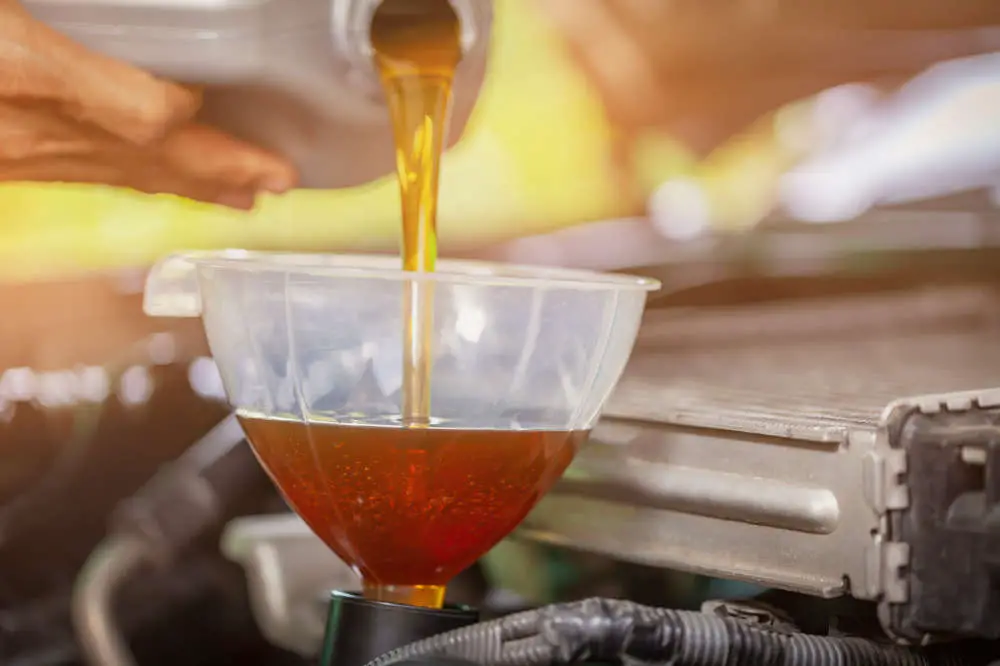Engine oil has a difficult task. It must be thin enough to allow the engine to start while still being thick enough to give enough protection when the engine is running.
Taking care of your metal pet is a satisfying job. Even when its oil levels give us more work. But, don’t worry, for every problem, there needs to be a solution.
In this article, find out what is causing your oil level to rise and what you can do to bring your Porsche’s state back to normal. Let’s get started!
Advertising links are marked with *. We receive a small commission on sales, nothing changes for you.
Symptoms of a High Oil Level in Your Porsche

Stop driving as soon as it is safe to do so if you are experiencing any of the issues described below.
Check the engine oil level after carefully parking on a flat surface.
1. Blue-ish Smoke Coming Out of the Exhaust
It’s probably burning engine oil if you see a somewhat blue-tinged smoke coming out of the exhaust or engine (or if other cars spot it and signal you down).
This might be due to a leak spilling oil onto the hot metal or too much oil.
2. Smell of Burning
The aroma of burning oil is distinct and unpleasant. There might be an oil leak, or it could be leaking out onto hot engine parts if you smell it.
3. You See a Leak Stain Below Your Car
Uncontrolled oil pressure can cause breakdowns in the weak spots of your car, allowing oil to leak out.
After the automobile has been sitting for a time, you may see a puddle or tiny drops under the engine.
4. Warning Light for High Oil Pressure
Although not all cars have an oil pressure gauge, those that do may display a “high pressure” warning if the engine oil level is too high.
However, consider that a defective oil pressure sensor might result in erroneous gauge readings.
5. The Car isn’t Starting
Your Porsche will not start if the necessary spark for combustion cannot jump the gap in the spark.
The reason behind it can be the engine oil that is all over the plug.
6. Strange Oil Gauge Behavior
Your dashboard oil gauge can usually tell you if you don’t have enough engine oil.
But, the indicator can become confused because it is meant to work under different circumstances. So, if the engine oil is over the roof, your dashboard might not be the place to look for an answer.
7. Your Engine is Overheating
Insufficient lubrication between moving components causes friction. That can generate heat.
If this occurs throughout the engine because the foamy oil cannot function, the whole engine temperature may rise to harmful or dangerous levels.
Why Is Oil Level for Porsche That Important?
Engine oil is a versatile liquid that performs various functions in your Porsche.
Its primary purpose is to keep your engine’s moving parts lubricated.
Lubrication keeps these parts moving while also forming a barrier to keep them from grinding against each other.
Second, your engine oil works with your vehicle’s coolant to keep the engine from overheating.
It does this by decreasing friction between moving parts. That way, it ensures that heat distributes evenly throughout the engine. That is the goal, and that is better for your car than being concentrated in one area.
Finally, the engine oil in your Porsche serves as a cleanser.
Because engine oil is sticky, it may take up dust and impurities that have entered the engine system, preventing it from becoming clogged.
What Can Happen If Oil Level Is Too High?
If you have a high oil level in your car, it could be from adding too much oil by yourself or the malfunction is present.
If you wondered what could happen if you overdo the oil, here is a quick list of each reaction.
1. Inadequate Lubrication Causes Engine Damage
Overfilling the engine oil results in less lubrication between the moving components.
In most automobiles, the crankshaft lies above the oil pan and turns swiftly as the vehicle travels.
If the engine oil level rises to the point where it touches the crankshaft, the oil can be whipped into a froth by the crankshaft. It is like how a whisk aerates egg whites during cooking.
Bubbly oil will not lubricate or travel through the system as smoothly. The oil flow might decrease or stop entirely, causing the oil to overheat.
Parts will prematurely wear if the engine is not properly oiled, and the machine may even freeze up and stop functioning.
2. Seals and Gaskets that are Failing
When the crankshaft whips the oil, the system introduces air, increasing the volume and pressure.
Gaskets and seals are meant to keep a certain amount of oil from getting into places it shouldn’t. Thus, overpressurizing them will cause them to fail.
The front and rear main seals of the crankshaft, for example, are difficult to remove and replace.
3. Fouling of Spark Plugs
Excess oil may spill out and come into touch with the spark plugs. Once oil coats the plugs, the high voltage pulse that produces the spark may no longer reach them.
The next thing that could happen is that the spark may not be able to jump the gap to start combustion.
Engine misfires, difficult running, or even failure to start can be caused by faulty spark plugs. Should this problem arise, they are simple to replace.
4. Fouled Catalytic Converter
The catalytic converter makes exhaust emissions less harmful and is becoming quite heated when the car is working.
If the combustion chamber gets contaminated with oil or the oil gets farther down the exhaust system, it will likely burn up when it reaches the catalytic converter.
Oil burning in the catalytic converter will reduce its capacity to purify exhaust gases and may diminish its lifespan. Replacement of catalytic converters is costly.
Excessive oil can block the catalytic converter in severe circumstances. A clogged catalytic converter is harmful since it can become overheated and cause a fire.
What Can Be The Cause of High Oil Level in Porsche?
There are various causes of high oil levels in your Porsche. Here are the top four reasons.
Cause Number 1.
One of the most common reasons for uncontrolled oil pressure in vehicles and trucks is a clogged or blocked oil filter. The good news is that if this is the case, the solution is simple: do an oil change and replace the filter.
Remember that it can also happen while driving if something pops up and strikes your oil filter.
Cause Number 2.
The oil pressure will continue to grow without a place to go if your vehicle’s oil pressure relief valve is jammed closed.
When the pressure in an engine is too high or too low, pressure relief valves direct the oil.
Cause Number 3.
Oil loses its viscosity with time, making routes more challenging to navigate.
This raises the oil pressure naturally, which might cause issues in your car. Because not all oils are created equal, using heavier oil than your automobile requires might result in excessive oil pressure.
Cause Number 4.
Grime and other debris can accumulate in the channels of your engine, causing a blockage. You can try flushing the system a few times to clear some debris, but this isn’t sure to work.
The good news is that if you keep up with frequent oil changes, this is unlikely to happen.
What is the Solution to the High Oil Level in Porsche?
Play it safe and let some out if you have much more oil than the top of the dipstick range.
The procedure is straightforward: empty a cup or two at a time by releasing the drain cap like you would for an oil change.
After that, tighten the drain plug and let your engine idle for a minute.
Then turn it off and check the dipstick again, wiping it once and reinstalling it for a more accurate reading.
And do it all while parked on a flat area rather than on-ramps.
Vacuum oil extractor pumps are also available for under $100.
A long straw that goes into the dipstick tube suctions the oil out of your engine.
The third solution is to visit the Porsche technicians.

Luna Meschiari is a full-blooded car nut who is well known to local garages, as each article is meticulously researched and peppered with the latest piece of information. Guess what car she’s driving right now? A RAV4 2021 Hybrid. But her heart also sleeps for pickups like the F-150. Get to know Luna better on the about us page.
Advertising links are marked with *. We receive a small commission on sales, nothing changes for you.
